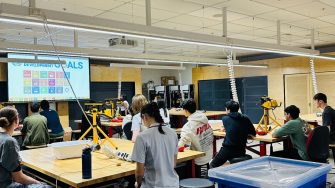High school students tackle SDGs
Sponsored by UNSW Engineering, a recent program helped local youth to find sustainable engineering solutions
Sponsored by UNSW Engineering, a recent program helped local youth to find sustainable engineering solutions

On Tuesday 5 November, 28 high school students from years 10 and 11 participated in the Water-Wise Energy Smart Program, aimed at empowering Sydney's youth to become sustainability champions.
Through an engaging blend of education and action, the students participated in workshops and hands-on activities focused on two specific Sustainable Development Goals (SDGs): SDG 6 (Clean water and sanitation) and SDG 7 (Clean and affordable energy).
The morning workshop and subsequent activity focused on renewable energy generation, with students creating a solar powered cube. Students individually built prototypes of small houses using mini solar panels to power fans installed in the houses.
“It was amazing to see the students’ for pressing issues like climate change and renewable energy generation,” said Dr Poddar.
“There were a few curious students who began brainstorming ways to improve the circuits that were originally demonstrated. They wanted to generate more power from their mini panels, which was a clear reflection of their passion, excitement, and potential.”
After a lunch break, the students participated in the water treatment, conservation and SDG 6 followed by a water filtration challenge, working as a team to working as a team of chemical engineers to design and operate a low-cost, low-energy filtering system to treat water.
The on-campus experience was funded by the UNSW Faculty of Engineering and facilitated by Dr Fitri Widhiastuti (UNSW School of Chemical Engineering) and Dr Shukla Poddar (UNSW School of PV & Renewable Energy), with support from Dr Helen Rutlidge (UNSW School of Chemical Engineering).
“So impressed by the enthusiasm of these high school students to create innovative designs for water filtration!
Their passion for clean water and creative problem-solving skills give hope for the future water treatment,” said Dr Widhiastuti.
“They embraced the messy science, collaborated brilliantly, and engineered some truly innovative solutions. The program sparked a real passion for STEMM and a deeper understanding of clean water’s importance.”
A post-event questionnaire indicates that the initiative was successful in its quest to foster youth champions, with 100% of the participants indicating that they are now motivated to incorporate more water-wise and energy-smart practices into their daily lives.